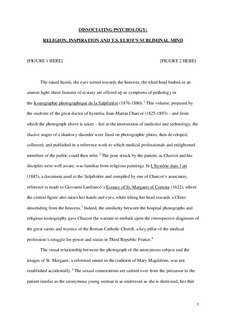| dc.contributor.author | Callison, Jamie Christopher | |
| dc.date.accessioned | 2018-02-22T08:35:48Z | |
| dc.date.available | 2018-02-22T08:35:48Z | |
| dc.date.created | 2017-11-06T20:41:32Z | |
| dc.date.issued | 2017 | |
| dc.identifier.citation | Callison, J. C. (2017). Dissociating psychology: religion, inspiration, and T. S. Eliot's subliminal mind. ELH: English literary history, 84(4), 1029-1059. doi: | nb_NO |
| dc.identifier.issn | 1080-6547 | |
| dc.identifier.uri | http://hdl.handle.net/11250/2486312 | |
| dc.description | Author's accepted version (post-print). | nb_NO |
| dc.description.abstract | Using archival resources, I outline T. S. Eliot's fascination with the porous borders between science and religion. I show how the notion of a dissociated consciousness developed by the French psychologist Pierre Janet informed the "dissociation of sensibility," and how Janet's idea, repackaged as the subliminal mind and used by psychologists of religion such as William James, shaped the account of the creative process developed in The Use of Poetry and the Use of Criticism. I suggest this contextualization of Eliot's penchant for both mysticism and skepticism informs the slippages in tone, at once visionary and moribund, in "The Hollow Men." | nb_NO |
| dc.language.iso | eng | nb_NO |
| dc.publisher | Johns Hopkins University Press | nb_NO |
| dc.title | Dissociating psychology : religion, inspiration, and T. S. Eliot's subliminal mind | nb_NO |
| dc.type | Journal article | nb_NO |
| dc.type | Peer reviewed | nb_NO |
| dc.description.version | acceptedVersion | nb_NO |
| dc.rights.holder | © 2017, Johns Hopkins University Press | nb_NO |
| dc.subject.nsi | VDP::Humaniora: 000::Språkvitenskapelige fag: 010::Engelsk språk: 020 | nb_NO |
| dc.subject.nsi | VDP::Humaniora: 000::Teologi og religionsvitenskap: 150 | |
| dc.source.pagenumber | 1029-1059 | nb_NO |
| dc.source.volume | 84 | nb_NO |
| dc.source.journal | ELH: English literary history | nb_NO |
| dc.source.issue | 4 | nb_NO |
| dc.identifier.doi | 10.1353/elh.2017.0039 | |
| dc.identifier.cristin | 1511598 | |
